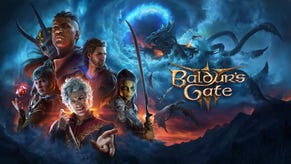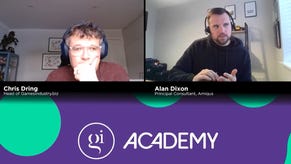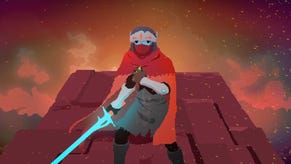What to think about when setting up an apprenticeship program
Beyond-FX CEO Keith Guerrette discusses the VFX studio's apprenticeship initiative, the challenges it faced and why it's worth it
In March, Los Angeles-based visual effects studio Beyond-FX announced a six-week apprenticeship program to help aspiring VFX artists get a foot in the games industry door.
The part-time paid initiative is one example of what companies can do to help diversify the way the games industry finds its talent. It's a topic the GamesIndustry.biz Academy touched upon related to the UK talent pool last year, exploring the links between traditional routes into games and the lack of diversity in the industry at large, and how to fix these issues.
The industry is also currently going through a talent crisis, with a lot of specialised jobs lacking candidates and studios simply not able to hire easily as a result. It's to address these issues that Beyond-FX decided to create its apprenticeship program.
"We're turning down amazing project opportunities almost weekly simply because we don't have any available artists"
"Throughout my entire career, the video games industry has been starved for VFX artists," says studio CEO, Keith Guerrette. "At the same time, trade schools have struggled to create and support curriculums that teach or produce qualified junior artists. I've frequently sat in meetings with schools expressing the challenge, and have found myself thinking 'These graduates are so close... I don't think they need much more to make them hireable'.
"Now that I'm running a VFX production company, I'm seeing this lack of available workforce with even more clarity: we're turning down amazing project opportunities almost weekly simply because we don't have any available artists. Simultaneously, we can't find more artists to hire that wouldn't require weeks of involved training.
"This apprenticeship program is our experiment to find solutions to all of these problems. We're challenging ourselves to create a mentorship and educational program that transforms a recent graduate or inspired artist into a production ready artist in just six weeks."
Guerrette says he's excited to share what Beyond-FX learns from running the programme with other development teams and educational institutions. For now, he talks to the GamesIndustry.biz Academy about the challenges and benefits of apprenticeship, and gives pointers about how to set one up.

Legal framework and finding support
Knowing where to start is always difficult with a task as vast as setting up a training program, and Guerrette admits that Beyond-FX "is walking into this knowing [it has] a lot to learn." But he also says that the best way to learn is to just do it.
There will never be one standardised way to approach creating an apprenticeship program, but for Beyond-FX it started with figuring out how to comply with local labour laws.
"Once we actually started the process of building the apprenticeship itself, it quickly became obvious that California's Labor & Employment laws are extremely prohibitive of this random effort for free training," Guerrette says. "In the end, we've had to hire each of our apprentices as part-time employees, and must adhere to all part-time employment laws -- regulated hours, payroll compliance, and restricted access included.
He continues: "We definitely went into this effort quite naively, but knowingly so. One of our first steps was to reach out to friends and find consultants. This fast forwarded us through several lessons that would have been very hard to learn on our own, namely around HR compliance, and so on.

"I'm a fan of California's labor laws for protecting employees, but I wasn't expecting to run head first into them while trying to pay someone to come and learn from us for a few weeks," he smiles.
While in some territories there could be state support for training, it wasn't the case for this initiative, so Guerrette had to find backing elsewhere.
"Unfortunately, if there is government assistance for this type of program, we haven't found it," he says. "Because we're not a registered educational institution, we don't have access to a great many resources that would normally be able to assist us, and it means that we are financially supporting this ourselves.
"On the other hand, we have been able to put together an incredible team of partners that are assisting us with hardware, software, and often more importantly, their time and expertise as instructors or consultants. I'd be remiss to not mention Cobratype Computers, JangaFX and SideFX for their support here, but also many phenomenal developers from around the world have agreed to share their knowledge as guest lecturers."
Making sure you gather a team of partners who can help you achieve your vision is key then, and so is making sure your staff is on board, with Guerrette mentioning that he felt "extremely fortunate" that the studio's artists agreed to spare time to help him build an entire game demo and curriculum for the trainees.
Figuring out the practical details
Beyond-FX then had to determine the specifics of the apprenticeship: duration, number of participants, how much to pay them, and so on. Again, there isn't one magic formula to figure out these aspects, and it will depend on your resources.
"The core challenge of this apprenticeship is to see how quickly we can cover the gap between the classic 3D Arts trade school education and the needs of a production VFX artist. Six weeks, part-time, is roughly a month of full-time work, which is not unreasonable for a studio to consider as a standard onboarding for an awesome new team member. For our business directly -- if we can standardise this apprenticeship to be easily sustainable, leveraging it to grow our team of artists might actually become the single most important part of our future success.
"If we can standardise this apprenticeship to be easily sustainable, leveraging it to grow our team might become the most important part of our future success"
"As for the number of apprentices that we've taken, we knew we wanted to start small, especially because we're footing the bill for everything, but we also knew that peer camaraderie when learning is incredibly important. We set our sights on three, expecting to not have too many applicants to choose from, let alone good ones. I was very wrong about that -- we had well over 50 applicants with very little advertising, and it was difficult to whittle them down past the top ten. In the end, we've accepted five apprentices for this season."
During the selection process, make sure you have the right measures in place for the apprenticeship to be accessible to candidates from various backgrounds. Avoid gender-coded language in your ad, make sure the pay is up to living standards in the area (if applicable), and provide flexible working options, among others.
While Guerrette didn't share many details on the tools used, he says Beyond-FX went into the application process knowing it wanted diversity among its apprentices.
"Not solely for the societal considerations," he added, "but because artists from different backgrounds make different, beautiful artistic choices while working on their art."
One aspect that was difficult to figure out was how to approach teaching a field as vast as VFX. This challenge will be different depending on the type of apprenticeship you're creating and in what area, but it's worth really taking the time to explore what you want to teach and how.
"I'm a fan of California's labor laws for protecting employees, but I wasn't expecting to run head first into them while trying to pay someone to come and learn from us for a few weeks"
"The field of real-time VFX is as varied as it is confusing," Guerrette explains. "Each game engine uses its own tools and technology, and each company using an engine often adopts their own workflows, techniques, and of course, art styles. The way we solve a problem depends entirely on the platform, game genre, art style, intended player experience, and developers that worked in the game before us. All of this is insane to try and teach.
"Our goal is to introduce the core ideas and considerations that artists are currently using to create quality effects across the industry. Simultaneously, we want to give the apprentices time to work, create, and play within an actual game production environment."
To this effect, Beyond-FX created 'Project Artifact' in Unreal 4, a first-person adventure game designed specifically for the apprenticeship program, with Guerrette highlighting the importance to help the apprentices create work that can be part of a portfolio -- the holy grail to an industry job.
"Each of the six weeks focus on a new category of VFX work, with the first week being a gigantic overview of the VFX production pipeline. Finally, [the sixth] week will be spent wrapping up more advanced discussions or anything else we forgot. Through this entire program, we're asking the apprentices to create visual effects within Project Artifact, with the hope that they'll not only have the experience to join a development team and hit the ground running as a production VFX artist, but also the portfolio examples to show it."
The benefits of apprenticeships
The No.1 benefit of setting up an apprenticeship is an obvious one: you're helping someone get their foot in the door, and subsequently contributing to expanding the talent pool in your area with diverse talent, which in turn can only benefit the games industry at large. It's a virtuous circle.
"Our commitment to each of our apprentices is to do everything we can to launch their careers as visual effects artists," Guerrette says. "We're welcoming our five apprentices into our studio as part-time employees, walking them through a custom six-week training program, and surrounding them with the work and conversations of our team working on their own productions.
"I cannot think of a better environment to learn about visual effects craftsmanship while also seeing firsthand what it actually means to be a production artist on a game development."
But of course, there's also benefits for the company, from bettering your workplace culture to good PR and recruitment opportunities.
"Internally, It's been an incredible forcing factor to have our artists create a culture around mentorship, building educational resources, and working together to explain, explore, and teach," Guerrette says. "We've already created a massive library of resources, content examples, and documentation that I'm very excited to grow and share further.
"Externally, if we're able to produce great VFX artists through this program, they're going to be working examples of our expertise, and I cannot think of a better form of marketing for our team. We also plan to repurpose many of the lessons, content, and findings from this program into various public resources and publications.
"And most tangibly, of course, we'll hopefully be able to create great employment opportunities for a few of the apprentices (or all!), and grow our team with artists that we already have confidence in."
The challenges of setting up an apprenticeship
As already hinted at, organising an apprenticeship program isn't an easy task, and even though it's early days for Beyond-FX (the program was ending this week), Guerrette says he can "already look backwards and admit how naive [he] was about the amount of time and energy that mentoring five people for eight hours a day, three days a week consumes" for everyone involved.
"It's quite a lot to juggle the needs of our apprentices while also keeping our production company running smoothly," he adds. "I suspect this will be the greatest challenge for us to think about as we begin plans for Season 2."
One issue that arose for Beyond-FX was around software, and this challenge highlights again the importance of finding good partners that can help you when setting up the program.
"ur industry has such ample opportunity to foster new talent and save a lot of money on recruiting fees and onboarding inefficiencies"
"The tools that we use as VFX artists are extremely expensive, and also extremely varied," Guerrette explains. "It's not unusual for one of our artists to touch over $20,000 worth of software in a single day, but as a studio, this is a balanced part of our business model, and we share licences where we can. Bringing in five apprentices and attempting to teach them in these software packages completely throws our model off balance, and solving this has been quite complicated.
"We're extremely fortunate to have the support of SideFX and JangaFX, who have given us free access for the apprentices to Houdini and Emergen, respectively. Other software companies weren't so kind, but usually only because we are still legally a for-profit business, not an educational institution."
Concluding our chat, we discuss the reasons why the industry should do more related to training and apprenticeship programs.
"At a glance, an apprenticeship doesn't look that different from an onboarding process for new hires, and when I look at it in that way, our industry has such ample opportunity to foster new talent and save a lot of money on recruiting fees and onboarding inefficiencies," Guerrette says.
"In my experience, most studios simply throw a new hire into a department and let the department leads, who are often extremely busy and overworked, control the onboarding process. The end result is an industry wide acceptance that new hires will take several weeks to become productive parts of the development team, and there's a huge reluctance to hire junior talent or entry level candidates from fear they'll require more attention.
"Our grand scheme with this apprenticeship is to challenge that process and test if it's possible to take that same month (or six weeks part time) to create a production ready artist from a 'risky' junior candidate."
He concluded: "If I were to give advice, it would be to not underestimate your team's desire to share and mentor, nor the general public's desire to learn from experts first hand."









